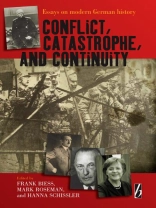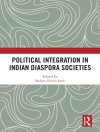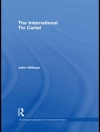Bringing together some of the most prominent contemporary historians of modern Germany alongside innovative newcomers to the field, this volume offers new perspectives on key debates surrounding Germany’s descent into, and emergence from, the Nazi catastrophe. It explores the intersections between society, economy, and international policy, with a particular interest in the relations between elites and the wider society, and provides new insights into the complex continuities and discontinuities of modern German history. This volume offers a rich selection of essays that contribute to our understanding of the road to war, Nazism, and the Holocaust, as well as Germany’s transformation after 1945.
Tabela de Conteúdo
Preface
Introduction
Frank Biess and Mark Roseman
PART I: GERMAN ELITES AND AN UNRULY SOCIETY
Chapter 1. Kulturkampf and Geschlechterkampf: Anti-Catholicism, Catholic Women, and Public Space
Michael B. Gross
Chapter 2. The 1923 Ruhr Crisis: The Limits of Active Resistance
Conan Fischer
Chapter 3. Political Violence, Gesinnung, and the Courts in Late Weimar Berlin
Pamela E. Swett
PART II: GERMAN SOCIETY AND A VIOLENT REGIME
Chapter 4. Beyond Conviction? Perpetrators, Ideas and Action in the Holocaust in Historiographical Perspective
Mark Roseman
Chapter 5. The Dissolution of the Third Reich
Hans Mommsen
Chapter 6. The Search for Missing Soldiers: MIAs, POWs, and Ordinary Germans, 1943–45
Frank Biess
PART III: CHANGE AND CONTINUITY IN GERMANY’S FOREIGN RELATIONS
Chapter 7. The Kaiser and His English Relations Revisited
John C. G. Röhl
Chapter 8. Appeasement and Counter-Appeasement: Nazi–Soviet Collaboration 1939–1941
Hartmut Pogge von Strandmann
Chapter 9. Imperialism as a Paradigm for Modern German History
Uta Poiger
Chapter 10. Americanization as a Paradigm of German History
Mary Nolan
PART IV: SMOOTH SURFACES, MURKY DEPTHS: THE SOCIAL AND CULTURAL HISTORY OF THE FEDERAL REPUBLIC
Chapter 11. The Radicalization that Never Was? Refugees in the German Federal Republic
Ian Connor
Chapter 12. Germany’s Special Path? Economic Sciences and Politics in the Federal Republic, 1945–1970
Alexander Nützenadel
Chapter 13. Catholic Elites, Gender, and Unintended Consequences in the 1950s: Toward a Reinterpretation of the Role of Conservatives in the Federal Republic
Mark Edward Ruff
Chapter 14. Memory, Morality, and the Sexual Liberalization of West Germany
Dagmar Herzog
Chapter 15. The Modern Guild: Rotary Clubs and Bourgeois Renewal in the Aftermath of National Socialism
S. Jonathan Wiesen
Chapter 16. Fighting to Win the Peace: 08/15 and West German Memories of the Second World War
Robert G. Moeller
Chapter 17. Rehabilitating Fatherland: Race and German Remasculinization
Heide Fehrenbach
Chapter 18. Epilogue: Zeitgenossenschaft: Some Reflections on Doing Contemporary German History
Hanna Schissler
Selected Readings
Contributors
Index
Sobre o autor
Frank Biess is Associate Professor for Modern German and European History at the University of California, San Diego. He is the author of Homecomings. Returning POWs and the Legacies of Defeat in Postwar Germany, and is co-editing a volume on the comparative history of the European “postwar” after 1945.












